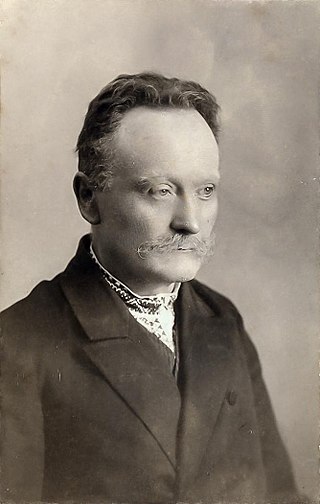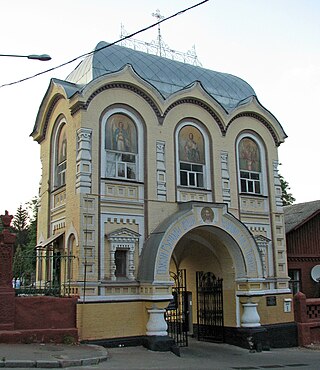
Liudmyla Starytska-Cherniakhivska (Ukrainian : Людмила Старицька-Черняхівська, 17 August 1868, Kyiv, Ukraine – 1941, unknown) was a Ukrainian writer, translator, and literary critic.

Liudmyla Starytska-Cherniakhivska (Ukrainian : Людмила Старицька-Черняхівська, 17 August 1868, Kyiv, Ukraine – 1941, unknown) was a Ukrainian writer, translator, and literary critic.
Born into a family of Ukrainian intelligentsia, Liudmyla Starytska-Cherniakhivska grew up in an atmosphere of appreciation of the arts and national values. [1] Liudmyla Starytska-Cherniakhivska, like other Ukrainians, including her family, had a tragic life and unfair death due to Russification policy.
Liudmyla Starytska-Cherniakhivska's family members include:
Liudmyla Starytska-Cherniakhivska in 1919 became a co-founder and deputy president of the National Council of Ukrainian Women. [3]
In her sixties, Liudmyla was first arrested and convicted during a show-trial of the Union for the Liberation of Ukraine in 1930, with 44 other defendants. She was imprisoned and exiled. In June 1941, the 73-year-old woman was again arrested, accused of carrying out anti-Soviet activities, and tortured. Liudmyla Starytska-Cherniakhivska died during the journey to exile in Kazakhstan [4] and her body was thrown from the train at a location still unknown.
Liudmyla Starytska-Cherniakhivska wrote poetry, prose, drama, memoirs and literary criticism for various publications including the Lviv almanac, Pershyi Vinok.

1913 – Wings ('Kryla')
1917 – The Last Sheaf ('Ostanniy snip')
1918 – Hetman Petro Doroshenko
1926 – Bandit Karmeliuk ('Rozbiynyk Karmeliuk')
1927 – Ivan Mazepa
Liudmyla Starytska-Cherniakhivska's memoirs include:
1893 – Before the Storm (Pered bureiu), is a historical novel, which was published in instalments in Pravda, Lviv journal, during 1893–1894. The author never finished the novel.
1899 – The Living Grave ('Zhyva Mohyla') was Liudmyla Starytska-Cherniakhivska's first major work. The novel was published in Kyivan Antiquity journal. The topic of the novel is the love of two young people. The story is intertwined with the elements of Ukrainian folklore and legends. [5] There is some parallel between The Living Grave and Shakespeare's Romeo and Juliet along with Gottfried August Bürger's Lenore . The novel is also a fine representative piece of Ukrainian Romanticism and reminiscent of such earlier Ukrainian Romantic works as Levko Borovykovskyi's ballad Marusia (1829) and Mykola Hohol's (Nikolai Gogol) long tale A Terrible Vengeance (1831–32). [6]
In 2015 Sova Books published its English translation of The Living Grave. One of the interesting facts about the publication is that on its cover the book depicts Daryna, the main heroine of the story and as a little tribute to the author of the story the publisher reproduced her face relying on one of Liudmyla Starytska-Cherniakhivska's photographs.[ citation needed ]
1929 – Diamond Ring ('Diamantovyi persten') was finished by the author six weeks before her first arrest. The manuscript remained unpublished for 64 years, until it appeared in Zona journal in 1993.

Ivan Yakovych Franko was a Ukrainian poet, writer, social and literary critic, journalist, translator, economist, political activist, doctor of philosophy, ethnographer, and the author of the first detective novels and modern poetry in the Ukrainian language.

Lesya Ukrainka was one of Ukrainian literature's foremost writers, best known for her poems and plays. She was also an active political, civil, and feminist activist.

Kyrylo Hryhorovych Stetsenko was a prolific Ukrainian composer, conductor, critic, and teacher. Late in his life he became a Ukrainian Orthodox Priest and head of the Music section of the Ministry of Education of the short-lived Ukrainian People's Republic.

Kyiv National Ivan Karpovych Karpenko-Karyi Theatre, Cinema and Television University is the national university specializing exclusively in performing arts and located in Kyiv, Ukraine. It is a multidisciplinary institution that includes a department of theatrical arts and the Institute of Screen Arts. The university has four campuses around the city of Kyiv and a separate student dormitory. The acting rector of the university is Inna Kocharian.

Mykhailo Petrovych Starytsky, in English Michael Starycky, was a Ukrainian writer, poet, and playwright.

Olha Petrivna Kosach, better known by her pen name Olena Pchilka, was a Ukrainian publisher, writer, ethnographer, interpreter, and civil activist. She was the sister of Mykhailo Drahomanov and the mother of Lesya Ukrainka, Olha Kosach-Kryvyniuk, Mykhailo Kosach, Oksana Kosach-Shymanovska, Mykola Kosach, Izydora Kosach-Borysova and Yuriy Kosach.

Kobzars and bandurists were a unique class of musicians in Ukraine, who travelled between towns and sang dumas, a meditative poem-song. Kobzars were usually blind, and required the completion of a three-year apprenticeship in specialized Kobzar guilds, in order to be officially recognized as such. In 1932, on the order of Stalin, the Soviet authorities called on all Ukrainian Kobzars to attend a congress in Kharkiv. Those that arrived were taken outside the city and were all put to death.

Baikove Cemetery is a historic cemetery memorial in Holosiivskyi District of Kyiv, Ukraine. It is a National Historic Landmark of Ukraine and is known as a necropolis of distinguished people.

Ivan Matviiovych Steshenko was a Ukrainian politician, writer, translator, and academic of the Shevchenko Scientific Society. He had several pen-surnames: Serdeshny, Sichovyk, Svitlenko, and Stepura.

The Mykola Lysenko Music Competition, named after Mykola Lysenko, was founded in 1962 by the Ukrainian composers Andriy Shtoharenko, Yevhen Stankovych, Myroslav Skoryk, Levko Kolodub, the singer Yelyzaveta Chavdar, pianists Yevhen Rzhanov and the composer's granddaughter Ariadna Lysenko. In 1992, on the 150th anniversary of Lysenko's birth, it acquired international status.

The Executed Renaissance is a term used to describe the generation of Ukrainian language poets, writers, and artists of the 1920s and early 1930s who lived in the Ukrainian Soviet Socialist Republic.

Klym Lavrynovych (Lavrentiiovych) Polishchuk was a Ukrainian journalist, poet and writer.

Irena Turkevycz-Martynec was born in Brody, Kingdom of Galicia and Lodomeria, and came to Canada, to Winnipeg, in 1949. She was a Prima donna in the Lviv Theatre of Opera and Ballet, and performed in Paris, Vienna, Berlin, Prague, and many other European cities during her long and storied career.

Mariya Varpholomiivna Livytska was a Ukrainian writer, memoirist, and public figure. She was an Activist in the Ukrainian women's movement and headed the Union of Ukrainian Women in Poland. She was married to the president of the Ukrainian People's Republic in the exile of Andriy Livytskyi.
Nocturne is an opera in one act by the Ukrainian composer Mykola Lysenko written in 1912 and first performed in Kyiv soon after composer's death.

The Honorary Diploma of the Cabinet of Ministers of Ukraine is a government award for many years of hard work, exemplary performance of official duties, personal contribution to economic, scientific, technical, socio-cultural, military, public and other spheres of activity, service to the Ukrainian people in promoting the rule of law and implementation of measures to ensure the protection of the rights and freedoms of citizens, the development of democracy, and the effective operation of executive bodies and local governments.